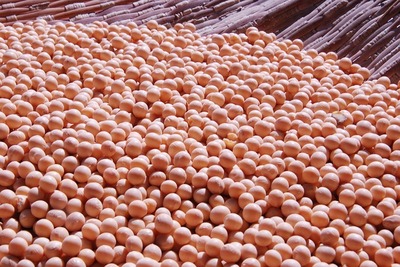Wisconsin Soybean Farmers Worry About New Regulations from Europe
Thursday, March 6th, 2025 -- 8:01 AM

(Courtney Everett, Wisconsin Public Radio) Wisconsin’s 16,000 soybean farmers produce about $1.3 billion worth of soybeans every year.
According to Courtney Everett with Wisconsin Public Radio, these farmers are nervously eyeing new regulations proposed by the European Union that would restrict imports of crops that contain certain pesticides.
Shawn Conley, professor and the state soybean and small grain specialist at the University of Wisconsin-Madison, recently told WPR’s “Wisconsin Today” that the new regulations, along with a trade war and federal funding cuts, could hit some Wisconsin farmers hard.
“I think we’ll see another big subset of farmers who leave the industry,” Conley said. “Probably not willingly in the next couple of years.” Doug Rebout, who was elected last month as the president of the Wisconsin Soybean Association, agreed that the EU’s proposed regulations could be a blow to the state’s farmers.
A family farmer, Rebout raises more than 4,000 acres of alfalfa, corn, soybeans and wheat in Janesville. “We won’t be able to export as many soybeans, that can greatly affect our prices,” Rebout said.
Both Rebout and Conley spoke with “Wisconsin Today” about the potential impact of stricter regulations in Europe, the developing trade war and other issues facing farmers.
The U.S. Soybean Export Council estimates 238 million bushels of soybeans are exported from the nation to Europe annually. In Wisconsin, soybeans averaged $9.92 per bushel in January, which was 39 cents higher than December’s price but $2.68 lower than last January, according to a new report from the U.S. Department of Agriculture’s National Agricultural Statistics Service.
Rebout said the price of soybeans is shaped by international markets and demand. Rebout is the chair of the state Department of Agriculture, Trade and Consumer Protection’s citizen board.
He argued that Wisconsin’s farming practices are environmentally sound. “What we’re doing here on our farms is safe,” he said. “We’re not going to do anything that’s dangerous, we’re running a business.”
Conley said stricter regulations under the European Commission would be burdensome to farmers who would have to spend more money to verify they are following the EU’s regulations.
“That would fall upon the farmer to verify that those practices are being done at the farm level,” he said. “That time cost would come back to the farm gate.”
“We have a very rigorous U.S. Environmental Protection Agency and regulatory process here in the United States to confirm that the products are environmentally safe and economical,” Conley added.
As leader of the UW Soybean Research program, Conley said his team works with a group of farm leaders who are already examining ways to integrate new technologies and conservation practices into their production.
“Then, we communicate that to a peer group who can help make those changes,” he said. Conley said cover crops is one way Wisconsin farmers are looking to drive conservation efforts forward by preventing soil erosion and improving soil health.
Feel free to contact us with questions and/or comments.




